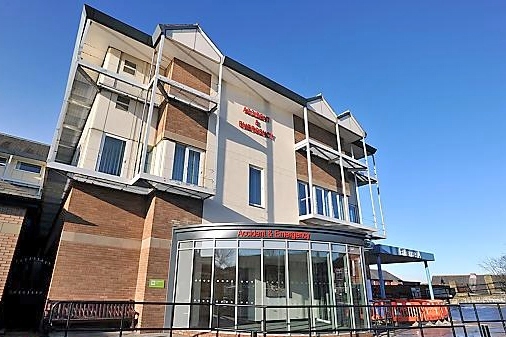Local hospitals made over £175,000 profit from vending machines in just 12 months
Date published: 11 September 2018

Royal Oldham Hospital Accident and Emergency Department
Local hospitals are making tens of thousands of pounds from vending machines.
The Pennine Acute Hospitals NHS Trust, which runs Rochdale Infirmary, Oldham Royal, North Manchester and Fairfield Hospitals, earned a profit of £175,450.27 for the 12 months to May 2018.
Last year NHS England chief executive Simon Stevens challenged trusts to reduce the sale of sugar-filled drinks to 10% or less of those bought on the premises, covering sugary soft drinks, milkshakes and hot drinks with added sugar syrups.
Nine out of ten trusts have now acted, and the proportion of drinks sold on NHS premises that contain added sugar has been dramatically cut from 15.6% to 8.7%, successfully meeting the challenge.
Ten million teaspoons of sugar have been removed from NHS canteens, shops and vending machines as a result – the equivalent of 1.1 million cans of fizzy drink, roughly 39,000 kilos of sugar and over 160,000,000 fewer calories.
A spokesman for Pennine Acute Hospitals NHS Trust said: “In the last 12 months the vending machines on our sites have been operated by Coca-Cola, Bensons, VMI and Wilkes Group with our current providers being Wilkes Group and Bensons. We get a rebate at an agreed percentage of profit.
“We signed up to the voluntary scheme to reduce our sales of sugary drinks to 10% or less of sold drinks in October 2017 and I am happy to say that we are fully compliant with this at all of our hospitals, including Rochdale Infirmary, The Royal Oldham Hospital, Fairfield General Hospital in Bury and at North Manchester General Hospital.”
It was estimated that the NHS in England spent £5.1 billion on overweight and obesity-related ill-health in 2014/15, whilst diabetes and its complications cost over £6 billion every year to treat.
One in six patients in hospital has diabetes, with a staggering 525,000 admissions in NHS hospitals linked to obesity – up nearly 20% from the previous year, according to Public Health England.
The statistics highlight the stark scale of the country’s obesity epidemic, which is adding to the pressure facing hospitals and frontline staff. Around nine out of 10 people with diabetes have Type 2 diabetes which is closely linked to obesity and there is strong evidence that it is preventable.
In 2016, the government launched its 10-year childhood obesity plan, introducing a nationwide tax on sugary drinks in April this year, an age-limit on purchasing energy drinks, reducing children’s sugar intakes by at least 20% by 2020, clearer labelling and making school food healthier.
The plan also aims to introduce further measures to be consulted on before the end of 2018, including a 9pm watershed on television advertising of unhealthy food and drink, ban price promotions and ban price promotion by location, such as checkouts.
Additionally, the latest figures from Public Health England show that almost one in four children (23.3%) aged 10-11 in the Rochdale borough is now classified as obese, the highest since records began.
https://www.rochdaleonline.co.uk/news-features/2/news-headlines/121348/childhood-obesity-crisis
In England, the revenue from the sugar levy will be invested in programmes to reduce obesity and encourage physical activity and balanced diets for school age children.
This includes doubling the Primary PE and Sport Premium and putting a further £10 million a year into school healthy breakfast clubs.
The current sugar reduction scheme across NHS trusts will remain in place for the rest of the year as part of the 2018/19 NHS healthy food and drink incentive programme, with all trusts expected to sign up this autumn.
Those trusts not signed up will not be able to get a slice of this year’s national incentive scheme.
NHS England is proposing to make it mandatory as part of the standard contract from 1 April 2019, subject to consultation.
As part of our investigation, Rochdale Online also approached Rochdale Borough Council, Link4Life and the local Heywood, Middleton and Rochdale Clinical Commission Group (CCG).
The CCG confirmed it does not have any vending machines in its facilities, as did Peter Gurney, Rochdale Borough Council’s facilities manager, who said: “The council does not have vending machines in any of its buildings.”
Link4Life refused to disclose information.
Do you have a story for us?
Let us know by emailing news@rochdaleonline.co.uk
All contact will be treated in confidence.
Most Viewed News Stories
- 1Middleton school hails another outstanding inspection result
- 2Drugs and cash seized during morning raids at suspected stash houses
- 3Former councillor and hospital campaigner Jean Ashworth has died
- 4No trams between Oldham and Rochdale this Sunday
- 5Northern Healthcare opens supported living service in former Rochdale hotel
To contact the Rochdale Online news desk, email news@rochdaleonline.co.uk or visit our news submission page.
To get the latest news on your desktop or mobile, follow Rochdale Online on Twitter and Facebook.


